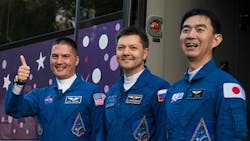International Crew Reaches Space Station after Minor Mishap
MOSCOW — Astronauts from Russia, Japan and the United States docked successfully with the International Space Station on Thursday after a two-month delay, despite a minor hiccup.
The Soyuz TMA 17M rocket — carrying cosmonaut Oleg Kononenko, U.S. astronaut Kjell Lindgren and Kimiya Yui of Japan — blasted off from the Baikonur cosmodrome on schedule after a two-month delay caused by the failure of a Russian rocket during an unmanned resupply mission.
The launch and the docking were successful even though one solar array — a type of power supply that captures energy from the sun — did not deploy on time.
Both Russian and U.S. space officials said the mishap didn’t affect the rocket’s flight because the other solar arrays were still operating.
“Now THAT was awesome,” Lindgren wrote on Twitter. “Thank you to everyone who made this dream come true!”
Russian television broadcast footage of a beaming crew next to Russia’s Gennady Padalka and Mikhail Kornienko, as well as Scott Kelly of NASA, who welcomed them on board the orbiting lab.
The spacecraft blasted off on schedule from Russian-leased Baikonur in the barren Kazakh steppe at 2102 GMT, and after a fly-around at around 1,150 feet, the rocket maneuvered to dock with the ISS at 0246 GMT. Russian space officials stressed that the launch had been smooth and that the third stage of the Soyuz rocket had separated on time but pointed to a possible problem with solar panels.
“A commission will probably be put together. Of course this situation will be looked into,” veteran cosmonaut Fyodor Yurchikhin said in televised remarks.
Dmitry Rogozin, deputy prime minister in charge of the space industry, ordered the Roscosmos space agency to resolve the problem.
“The same happened last year,” he said, suggesting that a possible manufacturing defect could be to blame.
Rebounding from Recent Fumbles, Including a Possible Defect
Scientists and space enthusiasts around the world were watching the launch closely — and with some concern — given the mission had been delayed by two months after the failure of a Russian rocket.
Russia was forced to put all space travel on hold after the unmanned Progress freighter taking cargo to the ISS crashed back to Earth in late April.
The doomed ship lost contact with Earth and burned up in the atmosphere. The failure, which Russia has blamed on a problem in a Soyuz rocket, also forced a group of astronauts to spend an extra month aboard the ISS.
A space workhorse dating back to the Cold War era, the Soyuz is used for both manned and unmanned flights.
Ahead of the launch, the three astronauts said they stood by the Russian space program but conceded that, in space, everything might not go as planned.
“Machinery is machinery. It can let you down,” Kononenko, the crew’s 51-year-old commander told reporters this month.
The trio will spend 163 days in space, with NASA’s Lindgren, 42, and the Japan Aerospace Exploration Agency’s Yui, 45, making their maiden space voyages.
The spacemen said they were Star Wars fans and had chosen the R2-D2 robot, a key character in the film series, as a zero-gravity indicator for their mission. (For the official poster of the ISS Expedition 45, the astronauts posed wearing brown Jedi robes and clutching light sabers.)
Sending the first man into space in 1961 and launching the first Sputnik satellite four years earlier are among key accomplishments of the Russian space program and remain a major source of pride in the country. But over the past few years, Russia has suffered several major setbacks, notably losing expensive satellites and unmanned supply ships to the ISS.
The United States has struggled with problems of its own, with SpaceX’s Falcon 9 rocket exploding minutes after liftoff from Florida’s Cape Canaveral in June. And in October, U.S. company Orbital’s Antares rocket exploded after launch.
By Anna Smolchenko
Copyright Agence France-Presse, 2015
About the Author
Agence France-Presse
Copyright Agence France-Presse, 2002-2025. AFP text, photos, graphics and logos shall not be reproduced, published, broadcast, rewritten for broadcast or publication or redistributed directly or indirectly in any medium. AFP shall not be held liable for any delays, inaccuracies, errors or omissions in any AFP content, or for any actions taken in consequence.
